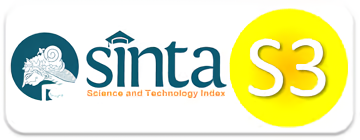The Factors Influencing Online Food Delivery Usage Intention on Semi-Endemic Period
Downloads
Background: In 2021, food delivery apps users in Indonesia reached the world highest number amounting 74.4% users. The main reason is the implementation of COVID-19 health protocol in Indonesia which limits outdoor activities. However, the COVID-19 pandemic situation in Indonesia indicates that COVID-19 is in the final phase of moving towards endemic or can be called a Semi-endemic phase since Indonesia government regulations, regarding COVID-19 health protocol, are getting loose by allowing people to do outdoor activities.
Objective: This study aims to examine the relationship between the variables in Theory of Planned Behavior (TPB), which consists of; attitude, subjective norms, perceived behavioral control and trust, and perceived risk in predicting online food delivery behavioral intention during the Semi-endemic period in Indonesia.
Method: This study adopts a quantitative research which employs 303 respondents who filled out an online questionnaire about food delivery applications usage for three months starting in July 2022.
Results: Attitude, perceived behavioral control, and trust are positively and directly influencing the usage intention, while subjective norms do not. There were two risk variables, namely privacy risk and COVID-19 risk, which had a significant impact on consumers' online food delivery usage intention.
Conclusion: Based on TPB, trust, and risk, this study showed that attitude, perceived behavioral control, trust, COVID-19 risk and privacy risk are significant in influencing online food application usage intentions in Indonesia during the semi-endemic period.
Keywords: online food delivery; online food delivery usage intention; perceived risk; semi endemic; theory of planned behavior.
Copyright (c) 2023 Fionabella Albirra , Michael Joshua Soesapto , Luisa Agata, Adinda Marisskeputri Pribadi, Istijanto , Lydia Apriliani

This work is licensed under a Creative Commons Attribution-NonCommercial-ShareAlike 4.0 International License.
Copyright notice:
- Authors retain copyright and grant the journal right of first publication with the work simultaneously licensed under a Creative Commons Attribution-NonCommercial-ShareAlike 4.0 International License that allows others to share the work with an acknowledgement of the work's authorship and initial publication in this journal.
- Authors are able to enter into separate, additional contractual arrangements for the non-exclusive distribution of the journal's published version of the work with an acknowledgement of its initial publication in this journal.
- Authors are permitted and encouraged to post their work online (e.g., in institutional repositories or on their website) prior to and during the submission process, as it can lead to productive exchanges, as well as earlier and greater citation of published work (See The Effect of Open Access)
















